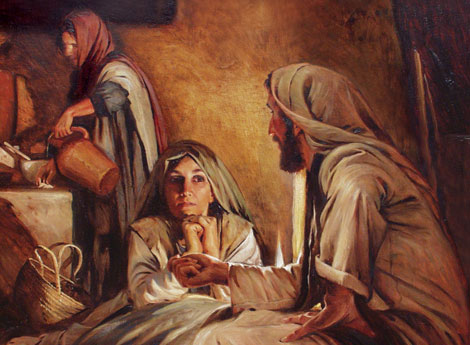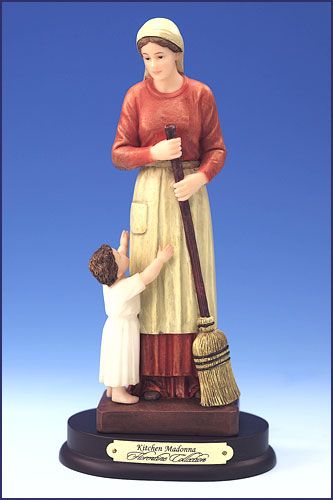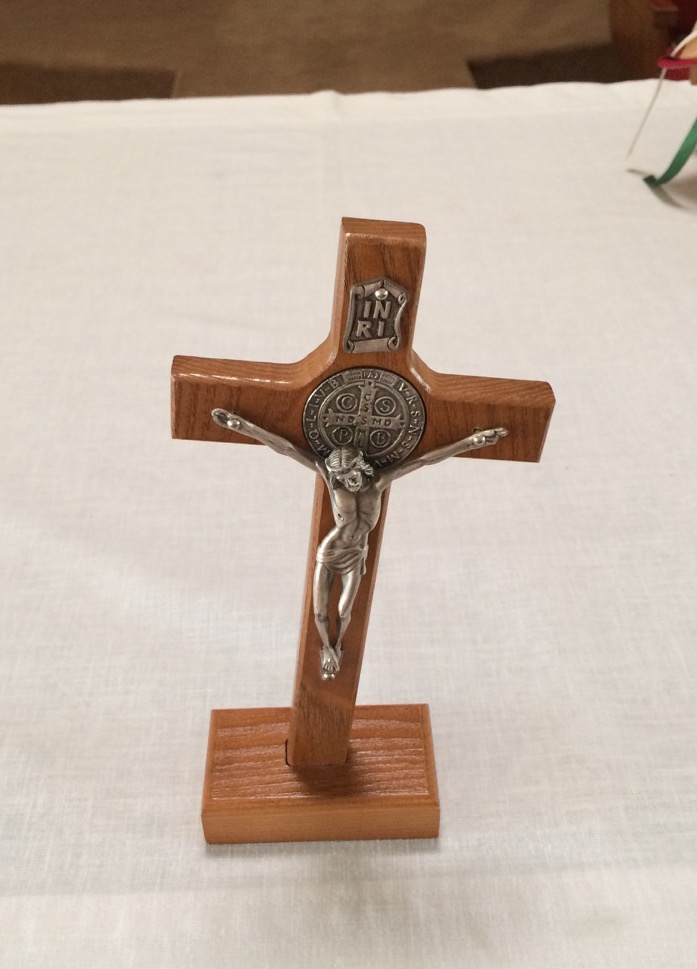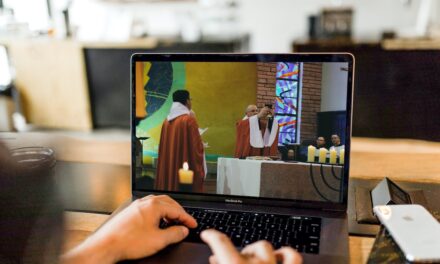There is a small statue on the windowsill over my kitchen sink that I see every time I wash the dishes. Titled “Kitchen Madonna”, it shows a very Old World-style mother with her hair swept back for chores and a broom in her hands, gazing down at her young child by her knees, who is reaching up and clamoring for attention. My husband and I received the statue as a wedding gift, but since the artwork wasn’t especially my style, I hadn’t given it much attention until lately. My infant daughter has recently reached the milestones of rapidly crawling over to wherever I am, pulling up, and clinging to my legs while loudly insisting what I assume means “Pick me up, now!” in her language. These days, I feel a lot like the mother in that statue.
God only knows by what twisted grown-up logic the pile of dirty dishes seems more compelling than the wondrous baby at my feet. Maybe that’s the foolishness Jesus gently warns Martha against:
Now as they went on their way, he entered a certain village, where a woman named Martha welcomed him into her home. She had a sister named Mary, who sat at the Lord’s feet and listened to what he was saying. But Martha was distracted by her many tasks; so she came to him and asked, “Lord, do you not care that my sister has left me to do all the work by myself? Tell her then to help me.” But the Lord answered her, “Martha, Martha, you are worried and distracted by many things; there is need of only one thing. Mary has chosen the better part, which will not be taken away from her. (Luke 10:38-42, NRSV)
My mom refers to the often-frustrating moments when other tasks get ignored in favor of childcare as “baby time”, and baby time is some of the slowest, most unproductive, important time there is. Martha’s sister Mary indulges in a similar sort of time when she chooses to relax in conversation with Jesus. In response to our busy schedules, Jesus tells us, “There is need of only one thing”—to listen to what God is saying through the person before us.
More than an important reminder to keep action balanced with contemplation, the story of Martha and Mary signals the goodness of extravagance in response to the divine before us. God squanders love lavishly on us (see the parable of the prodigal son—Luke 15:11-32). To learn to love as God does, we must let go of keeping score, holding back, or privileging other things before our relationships, including our relationship with God. Many forces in our society drive us to seek accumulation and influence, and to be productive so that we can achieve these things. But how do we treat those parts of life that aren’t “productive”—play, worship, suffering? What about those persons who aren’t “productive” members of society?
To most of us, like to Martha, it makes more sense to get the house ready for guests than to sit around chatting. I could certainly use some more time to study or clean rather than building yet another tower of blocks for my baby to topple over. When I let myself enjoy baby time, however, I resist the temptation to see my daughter as one more chore to take care of in a busy day. Instead, I delight in her babyhood, her emerging personality, and her growth. Baby time reminds me not to see the other as an obstacle in my path or an instrument to be used, but rather as a call to love even when it doesn’t seem to yield a direct benefit to me.










Beautiful! ! My children are all grown and one is expecting his own child,Francis Michael, who by the grace of God will arrive in February….and I loved and cherished every moment of babytime as you brilliantly called it! I had the bittersweet experience of taking care of my grandmother with cancer while tending my babies and large extended family and working part time….I remember the exhaustion well…but most of all I remember the storytimes, music, and blocks, dolls and little cars amid laundry baskets and dishes….I always reminded myself that the only luxury we could not afford was a perfect house and a spreadsheet schedule. The sweet smiles, hugs and kisses of babies and grandparents on somewhat sticky kitchen floors was paradise….
My children are also grown with children of their own. I cherish the time I spend with my grandchildren but I also cherish the time I spend with others whom God sends my way for they are all “a call to love”. That is my prayer every morning that I will be open to whomever God brings to me. May I be like Mary who “has chosen the better part”. Thank you for this inspiring reminder.
I’m a Catholic sister, so I don’t have any babies to give time to, but thanks for reminding me to use my time for the important things: prayer, relationships, etc.. My mom once told me that when she had her first child she was struggling to keep the house tidy. Her mother told her, “The house will be there long after the children are grown, but the children won’t. Don’t worry so much about the house; give your attention to the child.” I think that is wise advice.
Howdy! Do you know if they make any plugins to protect against hackers?
I’m kinda paranoid about losing everything I’ve worked hard on. Any tips?
I’ll right away grab your rss as I can’t to find your email subscription hyperlink or
e-newsletter service. Do you’ve any? Please permit me know in order that I may just subscribe.
Thanks.
WOW just what I was searching for. Came here by
searching for life coaching academy
One of the biggest requirements of any kitchen is kitchenware.
You may wonder what they can offer you that a regular oven doesn’t have, and
that would be a greater precision in what you’re cooking, meaning no
failed recipes or undercooked food. With it,
I just insert the probe, program the device to the
temperature that I want, and continue on with whatever I have going
on elsewhere.
Remarkable things here. I am very glad to look your article.
Thank youu a lot and I’m having a look ahead to touch you.
Will you kindly drop mee a mail?